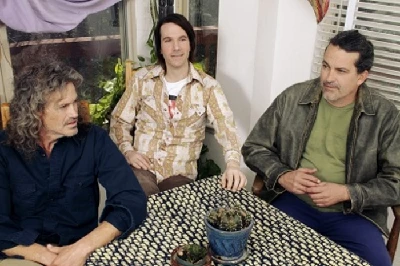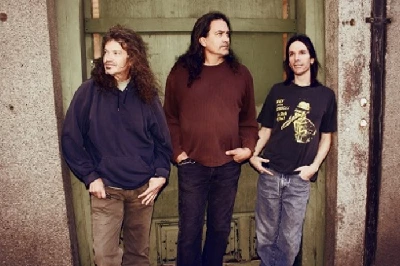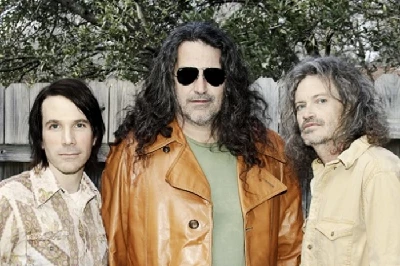published: 29 /
4 /
2013

Paul Waller talks to Curt Kirkwood, the front man with influential Arizona-based country act the Meat Puppets about his band's long history and their just released fifteenth album
Article
The Meat Puppets released their first eponymous hardcore-fuelled album way back in 1982. Then only two years later the group dramatically changed direction, injecting a little country influence into their music and slowing the pace down. Today you might call those early releases something awful like proto college rock if you were brave enough. I know I’m not.
Regardless of labels, the band has, since their formation released fourteen albums at the very top of their genre and yes, although that genre maybe populated by just the one band, themselves, it would appear that being loners has allowed them space to flourish. Their early records ‘Meat Puppets II’ (1984) and ‘Up on the Sun’ (1986) consistently make the all-time best album lists, and Curt and his brother Cris’ now legendary performance with Nirvana during their 1993 ‘MTV Unplugged’ set has gained the band a fan base that perhaps due to their more obtuse recordings they ever would have obtained by their own music alone.
On the eve of the release of their 15th (if you include the classic 1986 mini-LP ‘Out My Way’) original album Pennyblackmusic spoke on the phone to a somewhat laid back Curt Kirkwood, the founder and key ingredient in all things Meat Puppets in his Arizona home, about the new album ‘Rat Farm’ and the legacy that the band has left behind since those early days playing in their home city of Phoenix.
PB: The new album ‘Rat Farm’ and title track in particular is up there with the very best music that the Meat Puppets has ever produced. When you completed the recording, did you realise that you had a ridiculously high quota of quality songs at your disposal?
CK: Writing the songs, it’s a real natural thing. Sometimes I think to myself what is this going to be after I have finished with it, but I am not a great judge of my stuff with regards to prioritisation. Like choosing what is actually good, but I do have stuff that gives me a good feeling and ‘Rat Farm’ is one of those for sure.
PB: I guess your back catalogue is vast; it must make it difficult to judge such a hefty backlog of work? Have there ever been periods perhaps where you found yourself jaded with the whole Meat Puppets deal?
CK: Yeah, maybe. It usually happens after I am done. Normally I am pretty much into what I am doing so I have never become too jaded. I’m generally now as sick of myself as I am ever going to be at any given time. I am happy that I can come up with something these days that just doesn’t totally piss me off anyway. But, yeah, it is usually after I’ve finished a song and I generally think, “Ah, I’m done with that. What was I thinking?”
PB: You have now found yourself on Megaforce Records, the legendary heavy metal label. How have they treated you so far?
CK: They have been fantastic. They are well beyond just being metal today, and they have been working on quite a lot of different things. They put out Black Crowes, the Verve and a real good variety of stuff. They have also been great in letting me have a free hand.
PB: It’s similar in a way to when you were on SST; you seem to thrive in an environment where you may be seen to be the curveball or even the oddball choice on an otherwise hardcore or metal label.
CK: That would be the case with us on any label.
PB: One of my favourite Meat Puppet tracks is ‘Attacked by Monsters’ from 1989’s ‘Monsters’ LP. That track has very metal foundations at its route. Did you go ever through a heavy metal phase?
CK: Oh yeah, my metal phase… it’s always there. I am a useless product of the 70s in a lot of ways. I am a child of Black Sabbath and Led Zeppelin. That stuff that I first heard when I was ten, eleven, twelve all changed. When the Beatles broke up it was like “What the hell can I listen to now?” Then I found out that ‘Living Loving Maid’ was great… then came ‘Iron Man’. WOW!”
PB: Are you excited about the new Black Sabbath?
CK: It should be pretty cool. I heard that Brad Wilk [drummer from Rage Against the Machine-Ed] is playing drums for them, and I just did a show with him for Dave Grohl’s Sound City Players. I played with them at South By Southwest and he is a great drum player. It should be real cool, I have never seen Black Sabbath live. It’s a different Ozzy but it will be a hoot.
PB: Growing up in Arizona with your brother did you guys discover music at the same time?
CK: There wasn’t too much music in the house. It was more that there was music ambiently around at Christmas time, or when we were driving my mum would like to sing old stuff like ‘Goodnight, Irene’ and stuff like that, and we would try and sing along. For me, I got into music through the radio. Sometimes it was country music or it was pop music, just whatever was on the radio in Phoenix but then my friends turned me onto stuff.
Chris and I didn’t really hang out too much when we were kids. We didn’t until our later teens and we got into the same kinds of music. We went to some shows like Emerson, Lake and Palmer. We kind of had similar tastes at that point.
PB: And what about hardcore? Who dragged you into that scene?
CK: That was through Derek Bostrom [original drummer with Meat Puppets-Ed). Him and his friends were going to see early Devo, Iggy Pop and Talking Heads.
My first show was in fact David Bowie, and then I would see stuff like Joe Walsh, Lynyrd Skynyrd and the Allman Brothers, that stuff that was real big and popular, and then because I was hanging around with Derek he made me go see Iggy Pop. Brian James from the Damned was playing guitar, and he had Glen Matlock on the bass as well. That was Iggy’s band and I thought Brian James was just great, and it made me want to check out the Damned, which then led me to checking out the Sex Pistols who I really didn’t like at first but I came round, and then he gave me some Black Flag and some of that Southern California punk stuff.
From then on I got my hands on anything that I possibly could, and I got turned onto the reggae thing too, I’d only heard of Bob Marley and Jimmy Cliff until then. We listened to a whole lot of good hardcore at that point, and then we decided to start our band.
PB: So Meat Puppets released their debut LP which was a fast and punky effort with lots of melody thrown in. You got yourself a fan base going and a pretty sweet reputation on the scene, and then you release ‘Meat Puppets II’ which sounded completely different. Did you ever think that you may have shot yourselves in the foot or did you just not give a shit what anyone else thought?
CK: Oh, I didn’t care. I was interested in a lot of different kinds of music. For me, the reason I got into punk rock was because it was different; its purpose was to not limit itself. It just seemed to be a huge contradiction to get myself into punk rock expression and the freedom of music, only to then find myself limited by genres and classifications. It seemed right.
I liked to play different kinds of music so I thought that it would sort the audience out too. If people come to the show just to take speed and slam into each other or whatever their deal was then, I could thin that out and it worked. Saying that I loved playing hardcore and I still love to play fast music and it still works its way into the set, but it is just one thing taken from an infinite range of things that I like to do. It was a natural progression, but it was also fun to antagonise those people that would turn up and say, “This is supposed to be punk rock”.
PB: I, like many others, consider your ‘Up on the Sun’ album to be not only one of the finest Meat Puppet records, but one of the greatest albums of all time. Did you even have an inkling after the completion of the recording sessions that you had produced a stone cold classic LP?
CK: Hmm, I liked it a lot. It was one of them times that once it was finished it was pretty much just as I wanted it to be. You never know what you are going to get and I never go in with an aim or a target sound, but that one right away just seemed to have it all.
PB: You were already on London Records when you were asked to play on Nirvana’s unplugged show. They must have been over the moon that you got the offer?
CK: Yeah, we already had that one record, ‘Forbidden Places’, out on London. I think it’s one of our finest records but after it we were sort of in limbo. Then what initially was just an acoustic session at the Warehouse Studios in Memphis was successful enough for us to roll out a whole album [1994’s ‘Too High to Die’-Ed]. London really liked what we were doing. So we then went out on a tour with Nirvana and waited for that album to come out. Kurt said that he wanted to play these old songs with us and for us to join them for it. This all sort of happened at the same time, that session, the tour and then ‘Unplugged’ and ‘Too High to Die’ came about a month later.
After ‘Unplugged’, London didn’t know how to pitch us. It was kind of hard and I don’t blame them at all. We are so kind of… elusive. I mean starting with just the name of the record. It sounds just a little bit too hardcore which is tricky I think just from a promotional angle. I mean we don’t do hardcore. What are we? So they had the attitude of “You know what, here’s what they are: Nirvana likes ‘em.” It was promo heaven.
PB: Do you ever get down about it that since ‘Unplugged’ you are now best known for those three, be it fantastic songs that the Nirvana jammed with you, even though you have this massive, eclectic and rich back catalogue of music to your name?
CK: No, that doesn’t bother me, not at all. You cannot have every song be all encompassing and speaking to the masses, you know? It’s luck that these things happen. It doesn’t matter who you are. It was pretty easy me getting it around my head that Nirvana wanted to do those songs because I love those songs. ‘Oh Me’, ‘Plateau’ and ‘Lake of Fire’ are songs that it seems they stuck to in terms of me wanting to play them. They were going to try another two, but Kurt Cobain really liked those three the best. So, yeah, those are the songs demanded the most and I like them too.
PB: What I loved most about ‘Too High to Die’ was the exquisite harmonies on the song ‘Things’. You must have been working really hard on them at that point?
CK: Yeah for sure, we started working on our harmonies on ‘Up on the Sun’. I have a love for the Beach Boys and the Who, and from them I wanted to get into harmonies and by the time we got round to ‘Too High to Die’ I really tried to get those down. I am always looking for a new angle on an old harmony style.
PB: Have you ever noticed how close the harmonies are on ‘Things’ to Blue Oyster Cult’s ‘Don’t Fear the Reaper’ or was that intentional?
CK: (Thinks for a few moments) I see what you’re saying, I get that. It wasn’t intentional but, yeah, I get that. That’s a good one.
PB: You and also your brother Cris both delve into painting and have produced some fantastic pieces, a lot of which have appeared on your album covers. I was wondering how much time you put into your artwork compared to that of the band?
CK: Very little. It’s just a hobby that I do when I can. Cris does it quite a bit more. He sits around and draws pretty consistently, but I go through phases. If I do a painting, then it’s just for fun.
PB: Do you display them or sell them?
CK: I haven’t really done that but Chris has. He has ventured into that a little bit more than me. The way I look at it is that you can already own the prints as album covers. I haven’t the motivation to do anything other than that. I don’t consider myself a painter or anything like that either. I said I would sell some stuff at one time back when MySpace was popular, and I got inundated with requests, and, yeah, I sold one or two of them, but I thought it was such a pain in the ass.
Plus anything I think that turns out real good I have trouble letting go of, I will end up using it on an album cover anyway. If I was going to sell them, I would have to paint a lot more.
PB: Finally, your brother infamously went off the rails at the turn of the new millennium. and that found you taking a break from the Meat Puppets. First you formed Eyes Adrift with Krist from Nirvana and Bud Gaugh from Sublime, and you also dabbled with a solo career when you released the ‘Snow’ album, but the project I really loved was Volcano that also had Bud in it. Do you think you guys will ever get back together for another record or tour?
CK: I don’t know about that. I don’t know how much music Bud plays these days. I still talk to him occasionally, but we definitely don’t have any plans for anything. I thought that record was really cool. It brought in a whole new flavour. Bud was able to bring in a whole lot of that Long Beach vibe, and we did it in Long Beach too. It was put out on Skunk Records, and we made like a thousand copies of it initially. We didn’t have a deal or anything. I really liked it, but it was never really properly for sale.
With Eyes Adrift, Krist Novoselic sort of re-arranged his life a little bit and stopped playing music all together for a bit, so that was what happened there. I am really happy with all those other things, but I am really happy we [Meat Puppets] got back on track.
PB: Thank you.
Picture Gallery:-

